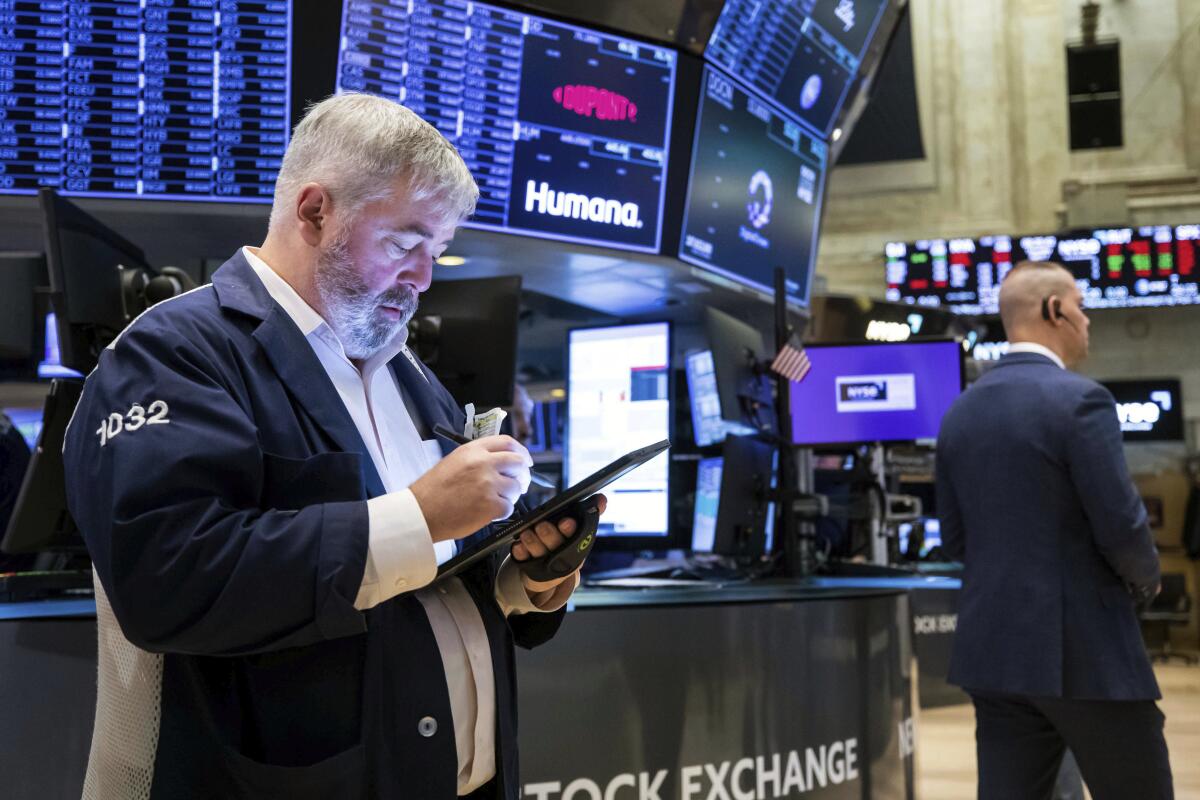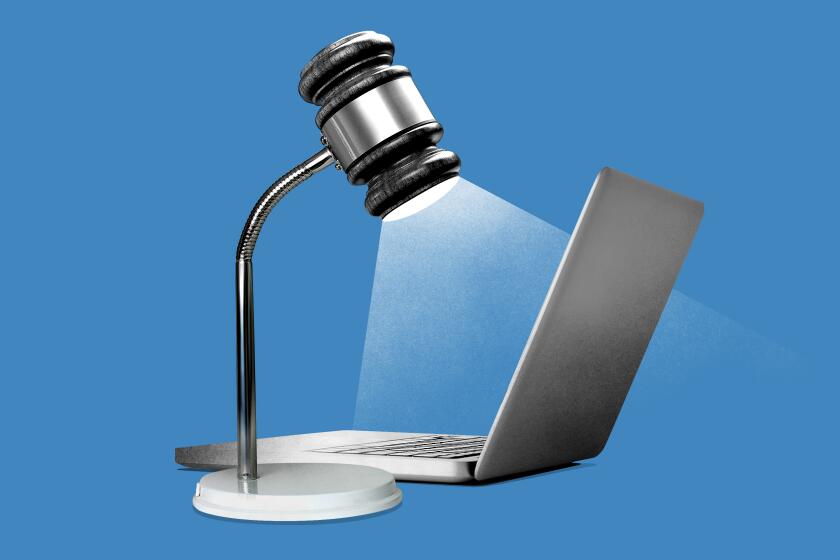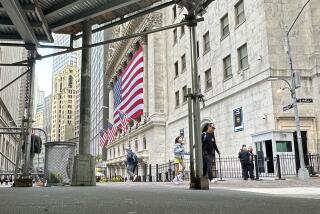Tech rebound lifts stocks on Wall Street after early slide

- Share via
A late-afternoon rebound led by technology companies helped drive stocks higher on Wall Street on Thursday, lifting the market from an early slide.
The Standard & Poor’s 500 rose 0.4%, its first gain after a two-day slump. The benchmark index is still on pace for its first weekly loss in four weeks.
The Dow Jones industrial average rose 0.3%, and the tech-heavy Nasdaq composite managed a 0.1% gain. Crude oil prices edged lower and bond yields rose.
The choppy day of trading came as investors weighed the latest updates from the Federal Reserve amid concerns about inflation. The central bank has signaled it is prepared to keep raising interest rates and reducing its stockpile of bonds and mortgage-backed securities to rein in the highest inflation in 40 years.
“The market is certainly having to digest a Fed that appears to be willing to be very aggressive in battling inflation,” said Rob Haworth, senior investment strategist at U.S. Bank Wealth Management.
The S&P 500 rose 19.06 points to 4,500.21. The Dow gained 87.06 points to end at 34,583.57. The blue-chip index had earlier been down 305 points. The Nasdaq added 8.48 points to close at 13,897.30.
Higher interest rates can make pricey growth stocks, such as those of technology companies, look less attractive relative to their earnings. Tech stocks have been among the biggest drags on the market the last couple of days and were weighing down the indexes Thursday morning. But the sector began to recover by midafternoon, helping lift the broader market. Microsoft rose 0.6% and Adobe gained 1.9%.
With interest rates rising, home buyers may be more tempted by ARMs as a way to cut costs. Here are the potential pitfalls to consider.
Stocks of healthcare companies, retailers and others that rely on direct consumer spending also rose after having been down earlier in the day. Pfizer rose 4.3%, Target jumped 5.7% and McDonald’s gained 1.2%.
Communication services stocks were among the biggest weights on the market. Twitter fell 5.4%.
Computer and printer maker HP surged 14.8% for the biggest gain in the S&P 500 after Warren Buffett’s Berkshire Hathaway disclosed an 11% stake in the company.
Bond yields rose. The yield on the 10-year Treasury rose to 2.65% from 2.61% late Wednesday.
Every major index is in the red for the week after two big losses that were partly prompted by concerns over the Fed’s shifting policy as it tries to combat inflation.
Minutes from the Fed’s meeting last month showed that policymakers agreed to begin cutting the central bank’s stockpile of Treasury notes and mortgage-backed securities by about $95 billion a month, starting in May. That’s more than some investors expected and nearly double the pace the last time the Fed shrank its balance sheet.
The central bank is reversing course from low interest rates and the extraordinary support it began providing for the economy two years ago when the pandemic triggered a recession. It already announced a quarter-percentage-point increase and is expected to keep raising rates throughout the year.
Traders are now pricing in a nearly 80% probability the Fed will raise its key overnight rate by half a percentage point at its next meeting in May. That’s double the usual amount and something the Fed hasn’t done since 2000.
As many white-collar employees enter a third year of working from home, lawsuits demanding reimbursement for home-office expenses are on the rise.
Persistently high inflation has been threatening economic growth. Businesses have been raising prices on food, clothing and many other goods, and that has put more pressure on consumers. Some companies have been unable to offset the effects of inflation, even with price increases.
Duncan Hines and Birds Eye brands maker ConAgra cut its financial forecast for the year and said another round of price increases will be needed.
Wall Street is concerned about consumers eventually pulling back on spending as higher prices become too difficult to digest. Price increases were responsible for a rise in consumer spending in March; otherwise, the results revealed a pullback.
A rapid increase in interest rates could also affect corporate earnings growth, though gauging that depends on how aggressive the Fed will be.
“Do we have to take earnings expectations down?” Haworth said. “That’s what the market’s really [been] trying to decide over the last couple of days. Is the aggressiveness of the Fed going to change that equation?”
Russia’s invasion of Ukraine has also added to concerns about inflation. Energy prices have been particularly volatile and pushed gasoline prices higher. U.S. benchmark crude oil prices fell 0.2% but are still up roughly 31% for the year.
Investors received an encouraging update on the job market Thursday. The Labor Department reported that fewer Americans applied for unemployment benefits last week as layoffs remain at historically low levels.
More to Read
Inside the business of entertainment
The Wide Shot brings you news, analysis and insights on everything from streaming wars to production — and what it all means for the future.
You may occasionally receive promotional content from the Los Angeles Times.












